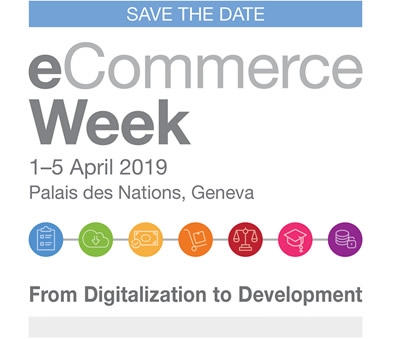Updating the rules for the digital economy – in support of an ambitious outcome of WTO e-commerce negotiations
4 Apr 2019 13:15h - 14:45h
Event report
[Read more session reports and live updates from the UNCTAD E-commerce Week]
Ms Felicity Hammond (First Secretary to the Australian Permanent Mission to the WTO, Australia) explained the context and the background for the World Trade Organization‘s (WTO) e-commerce negotiations. At the 11th WTO Ministerial meeting in Buenos Aires (2017) Australia, Japan and Singapore presented a statement to begin e-commerce discussions within the WTO, which was followed by a year-long exploratory work lead by the three countries. After a joint statement at the 2019 World Economic Forum’s (WEC) meeting in Davos which formally launched the negotiations, 76 countries are now part of the process. Currently, the leading countries are calling for negotiated text proposals by member states. Hammond clarified that these discussions represent an open and inclusive consultation process which is member-driven and whose outcome will rely on the existing WTO principles. Nearly half of the 76 participating countries are developing economies and 2 are from least developed countries (LDCs). She invited more developing countries (especially from Africa) to join the negotiations in order to further discuss the link between e-commerce and development.
Mr Esa Kaunistola (DigitalEurope) affirmed that ensuring good rules governing e-commerce is crucial to securing the potential benefits derived from digitalising trade processes. Regulation is not an obstacle to e-commerce but rather a key element to ensure online trust as an enabler of digital trade. This also applies to cross-border data flows, which, although often labelled as the ‘free flow of data’, should also be regulated. On the other hand, he also considered that it is important to ensure that such rules are not overly restrictive and that exceptions for public policy reasons are envisaged. For example, provisions forcing data localisation measures should be motivated by security and privacy and not by protectionist purposes. He concluded by saying that the WTO Moratorium on customs duties (which prohibits customs duties or border controls on electronic transmissions) should be made binding upon states.
Ms Anna Frellsen (CEO, Maternity Foundation) presented the foundation’s safe delivery app which educates midwives in developing countries about basic safety and medical procedures for delivery of babies. As most of the delivery-related deaths (both for mother and new-born) can be avoided with basic interventions, the app strives to complement midwives’ medical training. Despite rendering the content available on the device once the application has been downloaded, she explained that the biggest challenge is still the low mobile Internet penetration rate in remote areas. She concluded by sharing with the audience four learning experiences: good results are not only about technology; there is a need to think of projects in terms of scalability; we must stress the importance of open collaboration; and we must blend standard procedures with customised approaches.
Dr Pascal Kerneis (Managing Director, European Service Forum, ESF) explained that the European Service Forum (ESF) is trade association representing multiple actors in service sectors such as banking, insurance, telecoms, and the transport industry. He considered that all trade is now about data and that the data economy is taking over the exchange and manufacturing of physical goods. ‘There is not a single transaction in the world of trade without two computers talking to each other’, he stated. He noted that the time is ripe for the WTO to discuss these issues, since before the call in Davos the private sector was losing hope in a possible multilateral outcome on e-commerce regulation. He summarised the two aims of the ongoing WTO discussions: to reach a high-standard agreement opening new market access and to have the largest possible number of countries sign the final agreement. He proposed that the content of the treaty should develop legally binding norms on the ‘easy issues’ namely those issues that most of the countries have not made reservations against, such as e-signature, consumer trust, rules on electronic public procurement, and antispam provisions. Agreeing with Mr Kaunistola, Mr Kerneis stressed the importance of making the WTO Moratorium on customs duties binding upon e-commerce negotiation parties and warned against the data localisation requirement, as it can be exploited by some countries for protectionist reasons.
Mr Nick Ashton-Hart (Geneva Representative, Digital Trade Network (DTN)) explained that the DTN is a federation of trade association groups and chambers of commerce worldwide, especially from developing countries. He explained that in his work he faces the same underlying issue of WTO e-commerce negotiations, namely, how to include different countries, with different levels of development, and different national interests in the same agreement. He provided several good reasons for developing countries to join the WTO negotiations. First, discussing regulatory frameworks for financial services (e.g. e-payments) is key for developing countries as ‘without access to financial services there is no online trade’. Second, the existing regulatory framework must be approached in a way that makes access to telecommunications and the Internet less costly for consumers (in LDCs, 1 megabyte of connection costs a third of a person’s monthly income). Third, e-commerce will lower the cost of formalities: in developing countries, the costs related to customs administration is very high. ‘By digitalising formalities you enable processes that take months to take place in a few minutes’, he concluded.
By Marco Lotti
Related topics
Related event

eCommerce Week 2019: From Digitalization to Development
1 Apr 2019 15:45h - 5 Apr 2019 15:45h
Geneva, Switzerland
